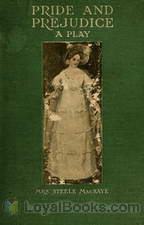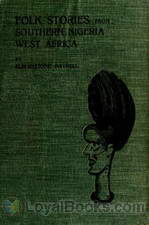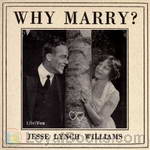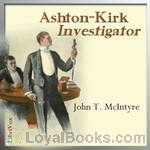|
Books Should Be Free Loyal Books Free Public Domain Audiobooks & eBook Downloads |
|
|
Books Should Be Free Loyal Books Free Public Domain Audiobooks & eBook Downloads |
|
Top Authors |
|---|
|
Book type:
Sort by:
|
By: Laurence Hope (1865-1904) | |
|---|---|
 Hira-Singh's Farewell to Burmah
Hira-Singh's Farewell to Burmah
Adela Florence Nicolson was an English poet who wrote under the pseudonym Laurence Hope. She was born in England and joined her father in 1881, who was employed in the British Army at Lahore (The traditional capital of Punjab for a millennium, Lahore was the cultural centre of the northern Indian subcontinent which extends from the eastern banks of the Indus River to New Delhi.) Her father was editor of the Lahore arm of The Civil and Military Gazette, and it was he who in all probability gave Rudyard Kipling (a contemporary of his daughter) his first employment as a journalist... | |
By: Marcel Allain (1885-1969) | |
|---|---|
 The Exploits of Juve
The Exploits of Juve
Fantômas was introduced a few years after Arsène Lupin, another well-known thief. But whereas Lupin draws the line at murder, Fantômas has no such qualms and is shown as a sociopath who enjoys killing in a sadistic fashion.He is totally ruthless, gives no mercy, and is loyal to none, not even his own children. He is a master of disguise, always appearing under an assumed identity, often that of a person whom he has murdered. Fantômas makes use of bizarre and improbable techniques in his crimes, such as plague-infested rats, giant snakes, and rooms that fill with sand... | |
By: L. W. Rogers (1859-1953) | |
|---|---|
 Elementary Theosophy
Elementary Theosophy
This book provides the basics of Theosophy and perhaps the beginning of a life long journey. Theosophy comes from the ancient wisdom that man and nature are as inseparable from the universe as the universe is inseparable from man and nature. It is a science and a philosophy, not a religion which depends on (dogma) faith. Knowledge gained through the study of Theosophy comes from the understanding of natural laws and harmony of the universe. Rogers shows us why we cannot separate ourselves from God (universe); the evolution of the soul; rebirth after physical death; why we don’t remember past lives and much more... | |
By: Constance Cary Harrison (1843-1920) | |
|---|---|
 The Old-Fashioned Fairy Book
The Old-Fashioned Fairy Book
"And now, mamma, until your tea is ready, we know what you must do," said the children, in a breath. "Tell us a story—a 'real, truly' fairy tale, about a giant and a dwarf, lots and lots of fairies, a prince and a beautiful princess with hair to her very feet, a champion with a magic sword, a dragon-chariot, a witch dressed in snake-skin—and, if you can, an ogre. Don't punish anybody but the witch and the ogre; and please don't have any moral, only let everybody 'live in peace and die in a pot of grease,' at the end of it... | |
By: J. Morris Slemons (1876-1948) | |
|---|---|
 The Prospective Mother
The Prospective Mother
A Handbook for Women During Pregnancy. This book, written for women who have no special knowledge of medicine, aims to answer the questions which occur to them in the course of pregnancy. Directions for safeguarding their health have been given in detail, and emphasis has been placed upon such measures as may serve to prevent serious complications. (Introduction by J. Morris Slemons) | |
By: Mary Keith Medbery Mackaye (1845-1924) | |
|---|---|
 Pride and Prejudice: A Play
Pride and Prejudice: A Play
Pride and Prejudice, a comedy of manners and marriage, is the most famous of Jane Austen's novels. In this dramatic adaption by Mary Keith Medbery Macakaye some liberties are taken with the storyline and characters, but it is still a fun listen or read. Perhaps a good introduction for someone not ready to tackle the complete novel ~ and for the reader familiar with the work, a laugh can be had at the changes that were made in order to adapt it to the stage | |
By: Solomon Benjamin Shaw (1854-?) | |
|---|---|
 Children's Edition of Touching Incidents and Remarkable Answers to Prayer
Children's Edition of Touching Incidents and Remarkable Answers to Prayer
Solomon Benjamin Shaw was a Methodist Episcopal minister, historian, essayist and editor. Solomon and Etta Ellen were married in McBride, Montcalm County, Michigan. Solomon resided in Chicago, Illinois for a time before taking up his principal residence in Grand Rapids, Michigan. Rev. Shaw labored on what he referred to as the "undenominational line". This stand constituted a middle ground between the association plan favored by the denomination-oriented members of the National and the independent congregationalists of the movement... | |
By: Frederick Milnes Edge | |
|---|---|
 Exploits and Triumphs, in Europe, of Paul Morphy, the Chess Champion
Exploits and Triumphs, in Europe, of Paul Morphy, the Chess Champion
Paul Morphy, born in New Orleans in 1837, was considered the greatest chess player of his era. He was a child prodigy who learned playing chess simply by watching family members play, and when he was only 9 years old, he was hailed as the best chess player in New Orleans. This book describes Morphy's trip to Europe, i.e., England and France, where he wanted to play the European Champion Staunton, a match that never came about as the correspondence included in this book shows. He did play - and beat - virtually every other strong player in Europe though, and tales of these matches and people make up a large part of this book... | |
By: Heywood Broun (1888-1939) | |
|---|---|
 Seeing Things at Night
Seeing Things at Night
This Book is a collection of humorous short stories which describe the comedy in everyday things and situations. | |
 Pieces of Hate and other Enthusiasms
Pieces of Hate and other Enthusiasms
This book is a collection of humorous short stories about ordinary instances in daily life. We learn many interesting things about life, such as how to court women successfully, what it feels like to be a god, and why sometimes it would be a good idea to exchange one's own newborn baby for a better one at the hospital. | |
By: Henry Bibb (1815-1854) | |
|---|---|
 Narrative of the Life and Adventures of Henry Bibb, an American Slave
Narrative of the Life and Adventures of Henry Bibb, an American Slave
Henry Walton Bibb was born a slave. His father was white although his identity was not positively known. Bibb was separated from his mother at a very young age and hired out to other slave owners for most of his childhood. Always yearning for his freedom, he made his first escape from slavery in 1842. He was recaptured and escaped, recaptured and escaped over and over; but he never gave up on his desire to be a man in control of his own destiny. | |
By: Lucy Larcom (1824-1893) | |
|---|---|
 A New England Girlhood: Outlined From Memory
A New England Girlhood: Outlined From Memory
Lucy Larcom was an American poet, teacher, and mil-worker. According to Wikipedia: "Larcom served as a model for the change in women's roles in society." This is her colorful autobiography. Here, she tells about her happy childhood, and her time working in the mill. Along the way, she speaks about topics like morality, independence, love and loss inside a family, a strong belief in god, and the effects of being poor. Fans of Gene Stratton Porter, Fanny Fern and Susan Warner, and Ella Wheeler Wilcox will be delighted with this book. Lucy's sunny personality makes this book a very uplifting and interesting read. | |
By: Elizabeth Wormeley Latimer (1822-1904) | |
|---|---|
 France in the Nineteenth Century
France in the Nineteenth Century
Author Elizabeth Latimer synthesizes notes from a variety of sources to produce this summary of the nation of France in the 19th century. (Summary by Cathy Barratt) | |
By: Arthur T. Pierson (1837-1911) | |
|---|---|
 George Müller of Bristol
George Müller of Bristol
George Muller was a great hero of faith. His greatest aim was to demonstrate that God answers prayer and can be trusted for every minute detail of life. Spending countless hours asking God to provide his needs, he only relied upon God. God called him to care for orphans and he conducted his orphanage in the same way, on faith alone. When a certain need was apparent, they would immediately go to God in prayer. In this dynamic dependance on God, He always proved faithful. He also established over a hundred schools, educating over a hundred thousand people! His example of absolute dependence on God stands in the gap of history to declare that God is enough, and He is faithful! | |
By: Adelaide Anne Procter (1825-1864) | |
|---|---|
 Three Rulers
Three Rulers
Adelaide Anne Procter was an English poet and philanthropist. She worked prominently on behalf of unemployed women and the homeless, and was actively involved with feminist groups and journals. She became unhealthy, possibly due to her charity work, and died of tuberculosis at the age of 38. Procter's literary career began when she was a teenager; her poems were primarily published in Charles Dickens's periodicals Household Words and All the Year Round and later published in book form. Her charity work and her conversion to Roman Catholicism appear to have strongly influenced her poetry, which deals most commonly with such subjects as homelessness, poverty, and fallen women... | |
By: Margaret Warde (1875-) | |
|---|---|
 Betty Wales, Freshman
Betty Wales, Freshman
First published in 1904, Betty Wales Freshman is the first book in an 8 volume series that follows Betty and her classmates throughout college and beyond. It takes place at Harding in New England (NOT to be confused with the Arkansas university) based on the author's time at Smith College in Massachusetts. Some humour and frivolity ensue as well as interpersonal drama among Betty and her many peers. And of course, the usual fascination with basketball that tends to run the gamut in the bountiful supply of books about most boarding school girls. (The popularity of this series inspired product placement by a dressmakers company.) | |
By: Sir Joseph Pope (1854-1926) | |
|---|---|
 Chronicles of Canada Volume 29 - The Day of Sir John Macdonald: A Chronicle of the First Prime Minister of the Dominion
Chronicles of Canada Volume 29 - The Day of Sir John Macdonald: A Chronicle of the First Prime Minister of the Dominion
A biography of Sir John A. Macdonald, the first Prime Minister of Canada. It was written by the man who served as Macdonald's private secretary from 1882 to 1891. | |
By: Dandin (6th Century) | |
|---|---|
 Twenty Two Goblins
Twenty Two Goblins
These 22 stories are told by the Goblin to the King Vikram. King Vikram faces many difficulties in bringing the vetala to the tantric. Each time Vikram tries to capture the vetala, it tells a story that ends with a riddle. If Vikram cannot answer the question correctly, the vampire consents to remain in captivity. If the king answers the question correctly, the vampire would escape and return to his tree. In some variations, the king is required to speak if he knows the answer, else his head will burst... | |
By: Adam Lindsay Gordon (1833-1870) | |
|---|---|
 Song of Autumn
Song of Autumn
Adam Lindsay Gordon was an Australian poet, jockey and politician. | |
By: Ethel Cook Eliot (1890-1972) | |
|---|---|
 Little House in the Fairy Wood
Little House in the Fairy Wood
A lonely boy is taken in by the friendly inhabitants of a little house in the woods. Through this adventure, he finds the fairy folk, nature, and happiness. | |
By: Katherine Keene Galt | |
|---|---|
 Girl Scouts at Home
Girl Scouts at Home
Little Rosanna Horton was a very poor little girl. When I tell you more about her, you will think that was a very odd thing to say. She lived in one of the most beautiful homes in Louisville, a city full of beautiful homes. And Rosanna's was one of the loveliest. It was a great, rambling house of red brick with wide porches in the front and on either side. On the right of the house was a wonderful garden. It covered half a square, and was surrounded by a high stone wall. No one could look in to see what she was doing... | |
By: Josephine Pollard (1834-1892) | |
|---|---|
 Life of George Washington in Words of One Syllable
Life of George Washington in Words of One Syllable
The Life story of a public man cannot help being to some extent the same thing as a history of the times in which he lived, and to the case of none does this remark apply with more force than to that of the "Father of his Country;" which very title shows the degree to which the personality of its bearer became identified with the public life of the nation. While a great deal of the space in this book, consequently, has had to be devoted to American Revolutionary History, it is hoped that excess in this direction has been avoided, and that the main purpose of the work will be attained, i... | |
By: Henry Ossian Flipper (1856-1940) | |
|---|---|
 The Colored Cadet at West Point
The Colored Cadet at West Point
Henry Ossian Flipper--born into slavery in Thomasville, Georgia on March 21, 1856--did not learn to read and write until just before the end of the Civil War. Once the war had ended, Flipper attended several schools showing a great aptitude for knowledge. During his freshman year at Atlanta University he applied for admittance to the United States National Military Academy at West Point. He was appointed to the academy in 1873 along with a fellow African American, John W. Williams. Cadet Williams was later dismissed for academic deficiencies. | |
By: William J. Lampton (1851-1917) | |
|---|---|
 Flag and the Faithful
Flag and the Faithful
LibriVox volunteers bring you 12 recordings of The Flag and the Faithful by William J. Lampton. This was the Weekly Poetry project for January 20, 2013.William J. Lampton was the second cousin of Jane Clemens (the youngest of the three daughters of Samuel Langhorne Clemens, better known by his pen name Mark Twain.)He launched his jounalist carreer in 1877 by starting the Ashland (Kentucky) Weekly Review, with his father’s money. Lampton wrote several book, as well as humorous poems he called 'yawps'. These were printed in the New York Sun and published in Yawps and Other Things ca. 1900. | |
By: Elphinstone Dayrell (1869-1917) | |
|---|---|
 Folk Stories from Southern Nigeria, West Africa
Folk Stories from Southern Nigeria, West Africa
A collection of folk stories and fairy tales from Southern Nigeria gathered by Elphinstone Dayrell, deputy commissioner of the region when the book was published. - Summary by Elsie Selwyn | |
By: Mary Hallock Foote (1847-1938) | |
|---|---|
 Touch of the Sun and Other Stories
Touch of the Sun and Other Stories
Four short stories by Mary Hallock Foote (1847–1938), an American author and illustrator. She is best known for her illustrated short stories and novels portraying life in the mining communities of the turn-of-the-century American West. She is famous for her stories of place, in which she portrayed the rough, picturesque life she experienced and observed in the old West, especially that in the early mining towns. She wrote several novels, and illustrated stories and novels by other authors for various publishers... | |
 In Exile and Other Stories
In Exile and Other Stories
Six short stories by Mary Hallock Foote (1847–1938), an American author and illustrator. She is best known for her illustrated short stories and novels portraying life in the mining communities of the turn-of-the-century American West. She is famous for her stories of place, in which she portrayed the rough, picturesque life she experienced and observed in the old West, especially that in the early mining towns. She wrote several novels, and illustrated stories and novels by other authors for various publishers... | |
By: Richard Haigh (1895-) | |
|---|---|
 Life in a Tank
Life in a Tank
Richard Haigh was an Infantry lieutenant in the 2nd Royal Berkshire Infantry Regiment serving in the Somme area in 1916. Shortly after Tanks were first used in battle in September of 1916 the British Army asked for volunteers, Lieutenant Haigh signed up and was accepted in December of 1916. He describes the training and actions he participated in until the war ended in 1918. He was awarded MC in 1916 as Lt. (acting Capt.) Richard Haigh, Royal Berkshire Regiment. He was commissioned from the RMC (Sandhurst) to the Berkshires 16th Feb 1915; on resigning his commission in 1919, he joined the General Reserve of Officers. | |
By: Ernest Protheroe | |
|---|---|
 Noble Woman The Life-Story of Edith Cavell
Noble Woman The Life-Story of Edith Cavell
Edith L. Cavell (1865–1915) was a British nurse who attended to soldiers of both sides during World War I, and helped some 200 Allied soldiers escape from German-occupied Belgium, for which she was arrested, court-martialed, found guilty of treason and sentenced to death. Attempts to mount an appeal failed, and she was summarily executed within hours of the sentence by a German firing squad. Publication of the news prompted spontaneous grief and worldwide condemnation. Many memorials were created around the world, including a statue adjacent to Trafalgar Square in London... | |
By: George Durston | |
|---|---|
 Boy Scout Aviators
Boy Scout Aviators
Follow the adventures of Harry Fleming, Dick Mercer, and Jack Young in this exciting Boy Scout adventure! Harry is an American Boy Scout separated from his country and hometown when his father has to go on a trip to England for business. He joins a Boy Scout troop there and meets Dick Mercer. Together they help solve an exciting mystery in the midst of heliographs, spies, and traps, finding their way to the spy headquarters, Bray Park. They must solve a mystery and save England, with the help of a Boy Scout they meet along the way, Jack Young. (Kangaroo692) | |
By: Ralph Chaplin (1887-1961) | |
|---|---|
 Bars and Shadows: The Prison Poems of Ralph Chaplin
Bars and Shadows: The Prison Poems of Ralph Chaplin
Ralph Chaplin and many other prominent members of the Industrial Workers of the World were imprisoned under the Espionage Act of 1917 as the United States entered World War I. As with Socialist presidential candidate Eugene V. Debs, these activists were accused of undermining recruiting efforts and the draft - even of encouraging soldiers to desert. Though they never gained the universal popularity of his anthem "Solidarity Forever," the poems and songs in this volume - composed during his four years in prison - represent the defiant attitude of a true rebel in the face of persecution. | |
By: DuBose Heyward (1885-1940) | |
|---|---|
 Carolina Chansons: Legends of the Low Country
Carolina Chansons: Legends of the Low Country
This is a collection of poems about Charleston and the South Carolina Lowcountry. DuBose Heyward was a Charleston native best known for his novel Porgy, which was the basis for the Gershwin opera Porgy and Bess. Hervey Allen, who later wrote Anthony Adverse, met Heyward after moving to Charleston to teach. Together they founded the Poetry Society of South Carolina, which is still active today. | |
By: Knight Russ Ockside (1830-1898) | |
|---|---|
 History and Records of the Elephant Club
History and Records of the Elephant Club
Mortimer Q. Thomson (September 2, 1832 – June 25, 1875) was an American journalist and humorist who wrote under the pseudonym Q. K. Philander Doesticks. He was born in Riga, New York and grew up in Ann Arbor, Michigan. He attended Michigan University in Ann Arbor, but was expelled along with several others either for his involvement in secret societies[1] or for "too much enterprise in securing subjects for the dissecting room."[2] After a brief period working in theater, he became a journalist and lecturer... | |
By: Gabriel Tarde (1843-1904) | |
|---|---|
 Underground Man
Underground Man
This post-apocalyptic novella tells the story of the downfall of civilisation and mankind following a solar cataclysm in the late 20th century. To survive, the remnants of humanity had to build a new civilization underground in the complete absence of all species except mankind, choosing to base it only on love and beauty, the fine arts and intellectual pursuits. In view of the sun's current inactivity, this frighteningly prophetic tale might have been written today, saving that the cultural references and the fluid prose might be beyond, if one dares say so, many modern writers... | |
By: Richard Dallas | |
|---|---|
 A Master Hand
A Master Hand
This murder mystery, written in 1903 by Richard Dallas (pseudonym), describes a fictional crime that took place in the New York City of 1883. A fine period piece as well as a clever detective story. (Introduction by Delmar H. Dolbier) | |
By: Stella Benson (1892-1933) | |
|---|---|
 Living Alone
Living Alone
This is not a real book. It does not deal with real people, nor should it be read by real people. But there are in the world so many real books already written for the benefit of real people, and there are still so many to be written, that I cannot believe that a little alien book such as this, written for the magically-inclined minority, can be considered too assertive a trespasser. -- Stella Benson (author) Published in 1919, and set in London during the First World War, Living Alone tells of the meeting of a recluse and a witch, then rambles through magic, morality and aerial dogfights on broomsticks... | |
By: Joseph Rodman Drake (1795-1820) | |
|---|---|
 Culprit Fay and Other Poems
Culprit Fay and Other Poems
A collection, The Culprit Fay and Other Poems, was published posthumously by his daughter in 1835. His best-known poems are the long title-poem of that collection and the patriotic "The American Flag" which was set as a cantata for two soloists, choir and orchestra by the Czech composer Antonin Dvořák in 1892-93, as his Op. 102. In the early part of the 19th Century both Drake and his friend Halleck were widely hailed by Americans as among the leading literary personalities and talents produced by this country... | |
By: Dhan Gopal Mukerji (1890-1936) | |
|---|---|
 Kari the Elephant
Kari the Elephant
The adventures of an Indian boy and his beloved elephant. Born near Calcutta, Mukerji won the Newbury Medal for children's fiction. | |
By: Eliza Haywood (c.1693-1756) | |
|---|---|
 Fortunate Foundlings
Fortunate Foundlings
A story of love and adventure, following the fortunes of a young man and woman each trying to make their way in the wide world. Horatio and Louisa are twins, abandoned in infancy and adopted by a wealthy bachelor. For various reasons both leave his protection and set off independently: Plucky and determined Louisa must defend her virtue and make her way in a man’s world, and her spirited brother seeks his fortune in the army. This energetic narrative gallops from city to court, from battlefield to convent, and across a number of European countries... | |
By: Molly Elliot Seawell (1860-1916) | |
|---|---|
 Throckmorton
Throckmorton
This is a novel about the lives of the members of the Temple family and their connections in Tidewater, Virginia, in the Reconstruction era. The widow Judith Temple and her sister in law Jacqueline live quietly on the Temple plantation, when the widower George Throckmorton returns to Tidewater. He had joined the Union Army in the war, and led with distinction. The lives of the girls are turned upside-down.. | |
By: Stella Benson (1892-1933) | |
|---|---|
 This Is the End
This Is the End
Some books have plots that drive relentlessly toward a conclusion. Others, like "This Is The End", just meander. It is the story of a Family halfheartedly searching for a missing relation who does not want to be found, while just off-stage, World War I is raging on the continent. It is a story about ordinary people trying to live ordinary lives in extraordinary times. The things they do are less important than the ways in which they do them: often comic, occasionally tragic, but always touching and true to life. It reminds us that Poetry and Romance can be found anywhere, hidden beneath the surface of the most commonplace things. | |
By: Unknown | |
|---|---|
 Fall of the Nibelungs
Fall of the Nibelungs
"The Fall of the Nibelungs" is Margaret Armour's plain prose translation from the middle high German of the "Nibelungenlied", a poetic saga of uncertain authorship written about the year 1200. The story is believed by many to be based on the destruction of the Burgundians, a Germanic tribe, in 436 by mercenary Huns recruited for the task by the Roman general Flavius Aëtius. The introduction to the 1908 edition summarizes the story, "And so 'the discord of two women,' to quote Carlyle, 'is as a little... | |
By: Edgar Allan Poe (1809-1849) | |
|---|---|
 Raven and Other Poems
Raven and Other Poems
"Once upon a midnight dreary, while I pondered, weak and weary, Over many a quaint and curious volume of forgotten lore—While I nodded, nearly napping, suddenly there came a tapping, As of some one gently rapping — rapping at my chamber door. "Tis some visitor," I muttered, "tapping at my chamber door — Only this and nothing more."". Those sonorous and somber words of Edgar Allan Poe that begin The Raven are part of most everyone's fond educational memories. Beautiful and haunting to hear and even more fun to read aloud... | |
By: Clayton Edwards | |
|---|---|
 Treasury of Heroes and Heroines
Treasury of Heroes and Heroines
It would be pleasant indeed to gather the characters of this book together and listen to the conversation of wholly different but interested couples—for this is a book of contrasts and has been written as such. Lives of the most dramatic and adventurous quality have been gathered from all corners of the earth, and from every age in history, in such a way that they may cover the widest possible variety of human experience. The publishers believe that such a book would not be complete without some characters that are no less real because they have lived only in the minds of men... | |
By: Rosalind Goforth (1864-1942) | |
|---|---|
 How I Know God Answers Prayer
How I Know God Answers Prayer
This book is a testimony of how powerful prayer is, how God answers every prayer, even if it is not just how we want it answered. Rosalind Goforth was a missionary to China with her husband and children. She had many, many opportunities to prove God's faithfulness and he never failed her if she was willing to trust him and put her every problem and difficulty in his hands. Her life is a wonderful testimony of what prayer can do! | |
By: Jesse Lynch Williams (1871-1929) | |
|---|---|
 Why Marry?
Why Marry?
Why Marry? is a comedy, which "tells the truth about marriage". We find a family in the throes of proving the morality of marriage to a New Age Woman. Can the family defend marriage to this self-supporting girl? Will she be convinced that marriage is the ultimate sacredness of a relationship or will she hold to her perception that marriage is the basis of separating two lovers."Why Marry?" won the first Pulitzer Prize for Drama. | |
By: Sarah Knowles Bolton (1841-1916) | |
|---|---|
 Lives of Poor Boys Who Became Famous
Lives of Poor Boys Who Became Famous
These characters have been chosen from various countries and from varied professions, that the youth who read this book may see that poverty is no barrier to success. It usually develops ambition, and nerves people to action. Life at best has much of struggle, and we need to be cheered and stimulated by the careers of those who have overcome obstacles.If Lincoln and Garfield, both farmer-boys, could come to the Presidency, then there is a chance for other farmer-boys. If Ezra Cornell, a mechanic, could become the president of great telegraph companies, and leave millions to a university, then other mechanics can come to fame... | |
By: Christy Mathewson (1880-1925) | |
|---|---|
 Pitching in a Pinch
Pitching in a Pinch
In this book Mathewson is telling the reader of the game as it is played in the Big Leagues.... It’s as good as his pitching and some exciting things have happened in the Big Leagues, stories that never found their way into the newspapers. Matty has told them. This is a true tale of Big Leaguers, their habits and their methods of playing the game, written by one of them. | |
By: Louise Mack (1870-1935) | |
|---|---|
 Woman's Experiences in the Great War
Woman's Experiences in the Great War
An eye-witness account of the fall of Antwerp to the Germans in the opening months of World War I, Mack’s story has passages of extraordinary vividness and immediacy. Flawed by the most treacly sentiment in some places and the most ferocious anti-German invective in others, her account endures as an uncommonly forthright, passionate testimony to those tragic events and the ordinary people who were the true heroes of them. As a forty-something, coquettish war correspondent wrapped in sable furs... | |
By: Charles R. Gibson (1870-1931) | |
|---|---|
 The Autobiography of an Electron
The Autobiography of an Electron
"While many scientific men now understand our place in the universe, we electrons are anxious that every person should know the very important part which we play in the workaday world. It was for this reason that my fellow-electrons urged me to write my own biography. I am pleased to say that my relationship with the scribe who has put down my story in the following pages has been of the most friendly description. I have allowed him to place what he calls "The Scribe's Note" at the beginning of each chapter, but it will be understood clearly that these are merely convenient embellishments, and that I am responsible for the story of my own experiences." (Introduction adapted from the text) | |
By: John Thomas McIntyre (1871-1951) | |
|---|---|
 Ashton-Kirk, Investigator
Ashton-Kirk, Investigator
Ashton-Kirk, who has solved so many mysteries, is himself something of a problem even to those who know him best. Although young, wealthy, and of high social position, he is nevertheless an indefatigable worker in his chosen field. He smiles when men call him a detective. "No; only an investigator," he says.He has never courted notoriety; indeed, his life has been more or less secluded. However, let a man do remarkable work in any line and, as Emerson has observed, "the world will make a beaten path to his door... | |
By: Basil Joseph Mathews (1879-1951) | |
|---|---|
 Book of Missionary Heroes
Book of Missionary Heroes
Through the centuries, the world has been witness to an unbroken trail of heroes--men and women who braved privation, danger, and death to bring the light of Jesus Christ to the darkest corners of the earth. Some are well known, others long forgotten, but all belong to the same indomitable band of torch-bearers. Join a few of these heroes as they face cannibals, battle slave traders, and care for sick enemies, always with one mission at the forefront--to serve their Lord and bring others into His light. | |
By: Annie L. Burton (c. 1858-) | |
|---|---|
 Memories of Childhood's Slavery Days
Memories of Childhood's Slavery Days
This is a short and simple, yet poignant autobiography of Annie Burton, who recounts her early carefree childhood as a slave on a southern plantation while the Civil War raged around her, and after the Emancipation Proclamation, how her life changed as she struggled to maintain herself and family, manage her finances, and develop as a free person of color. The last half of the narrative relies heavily upon speeches, poems, and hymns written by others that stirred Annie's religious passions and increased her pride in her heritage, including a very powerful speech by Dr... | |
By: Steele Rudd (1868-1935) | |
|---|---|
 On Our Selection
On Our Selection
The humorous account of Dad and Dave and the rest of the Rudd clan as they attempt to carve a farming 'selection' out of the Australian wilderness in spite of fire, famine, snakebite, and a loony hired hand. | |
By: Katharine S. Prichard (1883-1969) | |
|---|---|
 The Pioneers
The Pioneers
The Pioneers is set against the background of pioneering life in the Gippsland region of Victoria in pre-Federation Australia. Mary and Donald Cameron are free-settlers who make a home in the wilderness and grow a prosperous cattle operation that establishes their position as prominent members of the new settlement.At first, the novel privileges Mary’s perspective as she encounters escaped convicts, bush fires, and raising a son in a remote community. Later, it follows her son, Davey, as he struggles for independence against his father’s harsh authority... | |
By: Susan Edmonstoune Ferrier | |
|---|---|
 Marriage, Volume 1
Marriage, Volume 1
“Love!–A word by superstition thought a God; by use turned to an humour; by self-will made a flattering madness.” – Alexander and Campaspe. Lady Juliana, the indulged and coddled seventeen (”And a half, papa”) year old daughter of the Earl of Cortland, is betrothed by her father to a wealthy old Duke who can give her every luxury. She instead runs away and marries her very handsome but penniless lover. Very soon, they are forced to travel to Scotland to live with his quirky family in a rundown “castle” in the barren wilderness. Can this marriage survive?(Summary by P.Cunningham) | |
By: Dandin | |
|---|---|
 Hindoo Tales or the Adventures of Ten Princes
Hindoo Tales or the Adventures of Ten Princes
This book describes the adventures of ten Kumaras, i.e., young men, (all of whom are either princes or sons of royal ministers), as narrated by the men themselves. These narratives are replete with accounts of demigods, ghosts, gamblers, intrigues with voluptious women, astonishing coincidences, cockfights, anthropophagy, sorcery, robberies, murders and wars. | |
By: Eugene V. Debs (1855-1926) | |
|---|---|
 Labor and Freedom
Labor and Freedom
"While there is a lower class I am in it; While there is a criminal class I am of it; While there is a soul in prison I am not free." ( Eugene V. Debs) This collection of essays charts the thought and character of Eugene V. Debs. Debs was an influential early American labor leader, a founding member of the Industrial Workers of the World (IWW), and a Presidential candidate for the Socialist Party of America. In these essays, Debs employs his characteristically fiery rhetoric in a spirited defense of worker's rights, organized labor, women's suffrage, class solidarity, and the principles of economic socialism. | |
By: Fannie Hardy Eckstorm (1865-1946) | |
|---|---|
 The Woodpeckers
The Woodpeckers
The Woodpeckers is a wonderful introduction to the world of bird study for the young naturalist, covering such topics as how he finds food, courting, how he builds his nest, the interesting ways he uses his different body parts as tools, among other topics discussed in the book. If you wish to investigate further, the book has a few diagrams and an Appendix that contains more technical information such as detailed descriptions of the different species of North American woodpeckers which were not read as part of this audiobook. | |
By: William Babington Maxwell (1866-1938) | |
|---|---|
 Devil's Garden
Devil's Garden
Risque for its time, but tame by today's standards, The Devil's Garden is a story of passion and mystery. William Dale, the main character of the story is Postmaster of Rodhaven. He is introduced as an honest peasant of uncompromising temper, whose rough nature is ever softened by his pretty wife Mavis. Mavis is an orphan raised by her Aunt Petherick. Known as Will, and referred to as Dale throughout the story, he gets into trouble at the post office but thanks to the intervention of the local magnet of Rodhaven, he is cleared and reinstated... | |